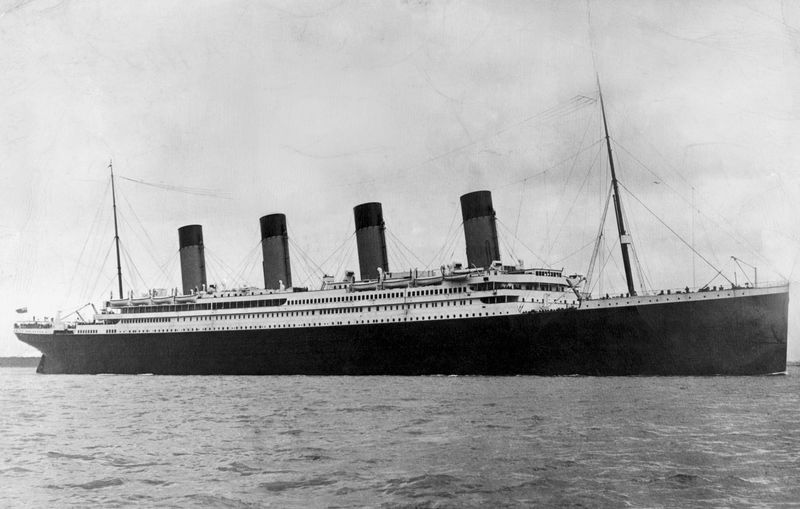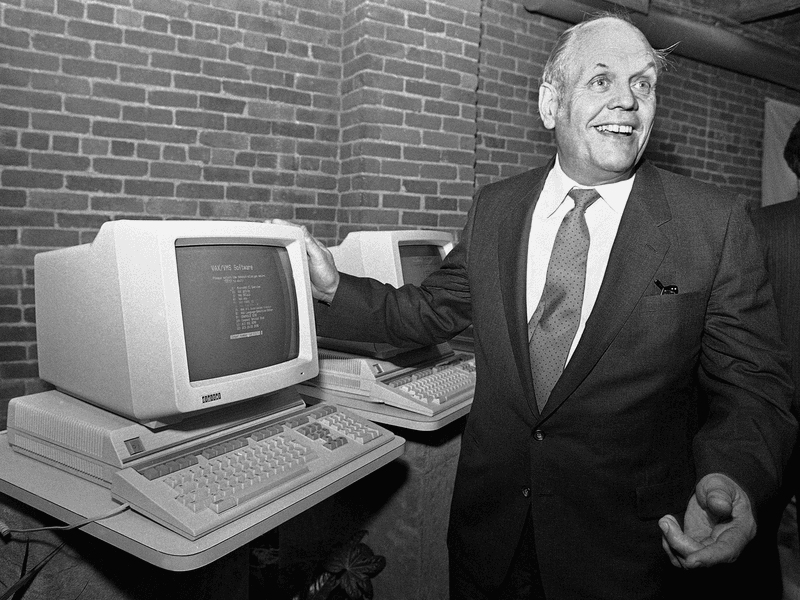History is filled with bold predictions that, with the benefit of hindsight, seem laughably inaccurate. From technology to economics, and even world events, experts have confidently made claims that missed the mark by miles.
These erroneous forecasts not only serve as cautionary tales but also remind us of the unpredictable nature of the future.
Here, we explore seventeen renowned predictions that ended up being completely wrong, offering a mix of humor, humility, and hindsight.
1. The Titanic’s Unsinkability (1912)
In the early 20th century, the Titanic was heralded as the unsinkable ship, a marvel of modern engineering. Experts and media alike lauded its design, believing it immune to the whims of the ocean.
However, on its maiden voyage in 1912, this colossal ship met a tragic fate, striking an iceberg and sinking. This prediction serves as a stark reminder that no matter how advanced technology seems, nature remains unpredictable.
The Titanic’s sinking challenged overconfidence in human-made constructs, teaching the world the value of humility and the importance of preparedness.
2. “There is no reason anyone would want a computer in their home.” (1977)
Ken Olsen, founder of Digital Equipment Corporation, famously declared in 1977 that there was no reason for individuals to have computers at home. At the time, computers were large, costly, and primarily used for business tasks.
Olsen’s prediction underestimated the rapid evolution of technology and the eventual miniaturization and affordability of computers. Today, nearly every household has at least one computer, highlighting the transformative power of technology.
This serves as a lesson in recognizing the potential for innovation and the often unforeseen ways technology can impact daily life.
3. “The horse is here to stay.” (1900s)
At the dawn of the 20th century, horses were the primary mode of transportation. Automobiles, seen as noisy and unreliable, were dismissed as a passing fad.
A Michigan banker famously stated, “The horse is here to stay, but the automobile is only a novelty – a fad.” This misjudgment failed to anticipate the dramatic shift in transportation that cars would cause.
As the automotive industry boomed, cities transformed, and horses became obsolete for travel. This prediction underscores the potential for new innovations to swiftly replace established norms, reshaping society in unforeseen ways.
4. “Television won’t last.” (1946)
In 1946, movie producer Darryl Zanuck declared that television wouldn’t last longer than six months. He believed audiences would tire of staring at a wooden box every night.
Zanuck couldn’t foresee the cultural impact and technological advancements that television would bring. Instead of fading, television became a dominant medium, revolutionizing entertainment, news, and advertising.
This prediction highlights the challenge of foreseeing technological adoption and the cultural shifts that accompany new media. It reminds us that initial skepticism can often be overturned by societal changes and innovation.
5. “The iPhone will fail.” (2007)
When Apple launched the iPhone in 2007, critics were skeptical. Steve Ballmer, then CEO of Microsoft, famously predicted its failure due to its high cost and lack of a keyboard.
Detractors doubted the appeal of a single device for calls, music, and internet browsing. Contrary to these predictions, the iPhone revolutionized the mobile industry, becoming a cultural icon and a precursor to the smartphone era.
This serves as a testament to the power of innovation and consumer adoption, proving that the market can embrace new ideas unexpectedly and transform entire industries.
6. “Nuclear energy will never be viable.” (1945)
In 1945, physicist Albert Einstein expressed skepticism about nuclear energy’s viability as a power source. At the time, nuclear technology was primarily associated with weaponry, and its peaceful applications seemed distant.
However, as research progressed, nuclear energy emerged as a significant power source, offering an alternative to fossil fuels. Today, it plays a crucial role in the global energy landscape.
This prediction highlights the potential for scientific advancements to unlock new possibilities, even when initial perceptions are clouded by existing uses and technologies. It also illustrates the importance of visionary thinking.
7. “The internet will collapse.” (1990s)
In the mid-1990s, as the internet began to expand rapidly, skeptics warned of its impending collapse. Experts claimed the infrastructure couldn’t handle the growing number of users and that the novelty would wear off.
However, the internet evolved, with technology improving to meet demand, and it became an integral part of modern life.
This prediction serves as a reminder of the resilience of technological ecosystems and the adaptability of society to embrace new paradigms.
It highlights the need for forward-thinking infrastructure planning and an openness to embrace transformational technologies.
8. “Space travel is a dream.” (1950s)
In the 1950s, many experts believed that space travel was merely a dream, confined to science fiction. They doubted humanity’s ability to breach Earth’s atmosphere and explore the stars.
Yet, just over a decade later, Neil Armstrong set foot on the Moon. This prediction underscores the rapid advancements in aerospace technology and the power of human determination.
It serves as a reminder that what once seemed impossible can become reality through innovation and perseverance. The journey to the Moon also sparked a global fascination with space exploration, influencing generations of scientists and dreamers.
9. “Online shopping will fail.” (1999)
In 1999, brick-and-mortar retailers were skeptical of online shopping’s potential, dismissing it as a passing trend. Critics argued that consumers preferred in-person experiences and that online security was a significant barrier.
However, as e-commerce platforms like Amazon evolved, consumer habits shifted dramatically. Today, online shopping is a dominant force in retail, offering convenience and a vast array of choices.
This prediction serves as a lesson in understanding consumer behavior and the transformative impact of technology on traditional industries. It underscores the importance of adaptability and the ever-evolving nature of consumer demands.
10. “Electric cars won’t succeed.” (1990s)
In the 1990s, electric cars were viewed as impractical and unlikely to succeed commercially. Critics cited limited range, high costs, and lack of charging infrastructure as insurmountable obstacles.
Yet, as technology advanced and environmental awareness grew, electric vehicles gained traction. Companies like Tesla revolutionized the industry, proving that electric cars could be viable and desirable.
Today, they play a significant role in the automotive market, signaling a shift towards sustainable transportation.
This prediction illustrates the potential for technological solutions to address environmental challenges and the necessity of reimagining traditional industries for a sustainable future.
11. “Home video will kill cinemas.” (1980s)
In the 1980s, the rise of home video technology led to predictions that cinemas would become obsolete. Movie industry insiders feared that audiences would prefer watching films at home, leading to the decline of theaters.
However, cinemas adapted, enhancing the movie-going experience with larger screens, surround sound, and 3D technology. Instead of dying, theaters became a destination for high-quality experiences.
This prediction highlights the adaptability of industries in response to new technologies. It also underscores the importance of innovation and understanding consumer desires to remain relevant in a rapidly changing market.
12. “Man will never fly.” (1900s)
At the turn of the 20th century, human flight was deemed impossible by many experts. Skeptics argued that heavier-than-air machines could never sustain flight.
Despite these doubts, the Wright brothers achieved the first powered flight in 1903, marking a new era in transportation. This prediction serves as a testament to human ingenuity and the ability to overcome perceived limitations.
The advent of aviation transformed global travel and commerce, shrinking the world and connecting cultures. It reminds us that daring to dream and challenge conventional wisdom can lead to groundbreaking achievements.
13. “The Y2K bug will cause global chaos.” (1999)
As the year 2000 approached, fears of the Y2K bug sparked widespread panic. Experts warned that computer systems worldwide would fail, leading to chaos in industries ranging from banking to utilities.
Governments and companies invested heavily in preventative measures, and when January 1, 2000, arrived, disruptions were minimal. This prediction illustrates the power of proactive problem-solving and the effectiveness of coordinated efforts to avert crisis.
While the Y2K bug did not cause the predicted chaos, it served as a wake-up call for the importance of updating technology and preparing for unforeseen challenges.
14. “Rail travel will be too fast to be safe.” (1800s)
In the 19th century, as railways expanded, some believed that trains traveling at high speeds would be unsafe for passengers. Experts argued that the human body couldn’t withstand the speeds exceeding 30 mph.
However, these concerns were unfounded, and rail travel became a vital part of transportation infrastructure. This prediction underscores how technological advancements often challenge existing beliefs and push the boundaries of what’s considered possible.
Railways revolutionized travel, connecting cities and boosting economies. It reminds us of the importance of embracing innovation and the potential for new technologies to redefine safety standards.
15. “Google is just a search engine.” (1999)
In 1999, Google was often dismissed as just another search engine, entering a crowded market dominated by established players. Critics failed to recognize its innovative algorithms and potential for growth.
As Google expanded, it revolutionized how people access information, becoming a tech giant with ventures in various industries.
This prediction highlights the importance of recognizing unique value propositions and the potential for companies to evolve beyond their initial offerings.
Google’s journey serves as a lesson in innovation, adaptability, and the capacity to disrupt established markets, reshaping the digital landscape in unexpected ways.
16. “The Beatles have no future in show business.” (1962)
In 1962, a Decca Records executive famously rejected The Beatles, claiming that guitar groups were on their way out. This prediction failed to foresee the cultural phenomenon The Beatles would become and their enduring influence on music.
The band’s innovation, charisma, and ability to connect with audiences worldwide revolutionized the music industry. This serves as a reminder that talent and creativity can defy conventional industry wisdom, creating lasting impacts.
The Beatles’ success story underscores the importance of recognizing potential and the transformative power of art in shaping cultural landscapes.
17. “Bitcoin is a bubble.” (2010s)
Since its inception, Bitcoin has been labeled a bubble by many financial experts, who predicted its inevitable collapse. While Bitcoin’s volatility and speculative nature have led to significant price swings, it has persisted and gained legitimacy as a digital asset.
This prediction highlights the challenge of assessing emerging technologies and the potential for unconventional ideas to reshape industries.
Bitcoin’s journey underscores the importance of understanding the evolving landscape of finance and the potential for digital currencies to play a role in the future economy. As cryptocurrencies continue to develop, they challenge traditional financial norms.

















